
Deep Listening - Impact beyond words - Oscar Trimboli
Oscar Trimboli
A podcast about creating practical tips and techniques to improve your daily listening.
- 49 minutes 10 secondsListening Masterclass - how to listen to what emerges in between - Part III of III
Claire Pedrick, Shaney Crawford and Oscar Trimboli explore the nuances and dynamics of workplace listening, including the importance of presence, flexibility, and curiosity.
Key insights include:
-
Listening is about creating shared meaning, not just exchanging information. Meaning only emerges in a collaborative space.
-
Second languages and their musicality can provide insights into how we communicate and connect.
-
Effective listening requires letting go of preconceptions and being willing to have your mind changed.
-
Observing and sensing beyond just hearing is a critical aspect of workplace listening that is often overlooked.
-
The process of noticing HOW people listen can be as enlightening as the content being discussed.
A masterclass of the art and science of workplace listening, with valuable lessons for anyone seeking to improve their communication skills.
- Audio Format - S4 Episode 21: How to Listen with Oscar Trimboli Wednesday, May 01, 2024 - The Coaching Inn from 3D Coaching
- Video Format - S4 Episode 21: How to Listen with Oscar Trimboli Wednesday, May 01, 2024 - The Coaching Inn from 3D Coaching
- Podcast Episode 127: how to listen to what emerges in between - Part I of III
- Podcast Episode 128: how to listen to what emerges in between - Part II of III
- Podcast Episode 129: how to listen to what emerges in between - Part III of III
- S3 Episode 06: Listening - with Kathryn Mannix
- how to listen – fundamentals – workplace edition
18 December 2024, 12:59 am -
- 53 minutes 47 secondsListening Masterclass - how to listen to what emerges in between - Part II of III
In the previous episode 127, Claire Pedrick and I discussed listening through many dimensions, including the role of pause and silence, the influence of the backstory and its impact on workplace change.
Now we are at Part Two of Three, you're about to hear is the reflections from 16 different listeners who initially emailed Claire with their feedback and were open enough to agree to record their perspectives.
Some were recorded on audio, and some were video.
I invite you to notice what these 16 listeners heard that was similar and different to you.
What I loved exploring was listening to the wide variety of adjectives and verbs.
They used to describe their insights, how they explained what they saw, and their thoughtful reflections about HOW it was said and WHAT was said.
- Audio Format - S4 Episode 21: How to Listen with Oscar Trimboli Wednesday May 01, 2024 - The Coaching Inn from 3D Coaching
- Video Format - S4 Episode 21: How to Listen with Oscar Trimboli Wednesday May 01, 2024 - The Coaching Inn from 3D Coaching
- how to listen – fundamentals – workplace edition
13 December 2024, 12:59 am - 48 minutes 36 secondsListening Masterclass - how to listen to what emerges in between - Part I of III
What emerges in between?
This episode is an 'experiment' between Claire Pedrick and Oscar Trimboli as a result of an introduction by Shaney Crawford from Japan.
They explore the role of second languages, the value of silence, and the importance of understanding the past.
What does a group listening audit sound and look like?
The experiment will continue for the next few episodes as they see what emerges in between episodes.
how to listen – fundamentals – workplace edition
12 December 2024, 12:59 am - 40 minutes 11 secondshow to effectively listen when you debate at work
This episode delves into the critical role of listening, particularly in the context of debates and the competitive advantage provided to participants.
Sasan Kisravi explains the significance of preparation in debate, especially when preparing both sides of the argument.
When preparing both sides of an argument, you can discover and anticipate the counterpoints that will help you discover multiple approaches to the same issue.
The concept of "competitive listening" is emphasized, and it is important to understand an opponent's argument and analyze its impact on the judge and audience.
Note-taking is a crucial tool for effective listening, but there is a difference between traditional note-taking and a more strategic approach. The latter involves creating a visual map of arguments, identifying key points, and tracking the flow of the discussion.
This method allows listeners to maintain focus, identify unaddressed points, and ultimately gain a clearer understanding of the debate.
The conversation also touches on the psychological aspects of listening, highlighting the importance of motivation and purpose.
By understanding the nuances of effective listening, individuals can improve their communication skills, build stronger relationships, and achieve greater success at work.
- Listening is a competitive advantage: Effective Listening is crucial for success in debates and workplace communication.
- Preparation is key: Understanding both sides of an argument and anticipating counterpoints is essential for effective listening and responding.
- Note-taking is a strategic tool: Creating visual maps of arguments helps maintain focus, identify key points, and analyze the flow of the discussion.
How to listen like a High Court Judge with Justice Michael Kirby
Listen like World Memory Champion Dr Boris Konrad
00:10:10 Douglas Murray on Malcolm Gladwell: "I Still Don't Feel Pity"
13 August 2024, 4:06 pm - 21 minutes 50 secondsthe significant consequences when you can decode non-verbal cues
The importance of listening at Level II, which is three-dimensional
- hear,
- see,
- and sense
Noticing nonverbal cues and their congruence with their words is a vital skill toward becoming a deeper listener.
While these cues can be informative, it's crucial to interpret them accurately and consider the context.
During this episode we explore noticing
- the face,
- posture
- and breathing
As we delve into the world of nonverbal cues, we are guided by Susan Constantine, Robin Dreeke, Michael Grinder and Andre Agassi. These four perspectives will create a deeper understanding by noticing, baseline and interpreting a range of non-verbals
Finally, Agassi shares a secret about decoding Boris Becker's non-verbal signals which led to an eight-match winning streak in the 1990s.
066: Listening to body language with Susan Constantine
077: The secrets of listening like a spy with Robin Dreeke
085: Hidden Secrets of how to Listen for non-verbals with Michael Grinder
11 July 2024, 1:59 am - 32 minutes 16 secondsWhat can you learn from over 33,519 workplace listeners?
Insights from 33,519 people about what gets in their way of listening and practical tips about what will imrpove your listening.
An update on the fourth generation www.listeningquiz.com including;
-
- aggregate listening profiles for more than 10 people
- cross-industry benchmarking
- administration features to track progress of completion
- volume discounts for organizations
- volume discounts for accredited consultants
Podcast Episodes Categorized by the Five Levels of Listening
Podcast Episodes Categorized By Korn Ferry Leadership Architect™ Competencies
Podcast Episode 046: Listen to your audience like SXSW
How to speak so my audience will listen Danish Dhamani
How to effectively listen to someone who is suicidal Kevin Briggs
One move ahead, how to listen like a chess grandmaster - Scott Sandland
the hidden value in your contact center and how to listen at scale with Authenticx’s Amy Brown
Learn how to listen with the patience of a neuroscientist Dr Alison J. Barker
Supercommunicators How to Unlock the Secret Language of Connection
17 June 2024, 6:02 am -
- 16 minutes 34 secondsthe hidden clues when you listen well in low trust group meetings
This episode of Deep Listening Impact Beyond Words explores the art of listening in diplomatic cross-cultural meetings, drawing insights from British Foreign Secretary James Cleverly's discussion with Cindy Yu on The Spectator's Chinese Whisper Podcast.
Key takeaways:
- Focus on non-verbal cues: Ambassador Cleverly emphasizes that what people don't say, their body language, note-taking, and response delays are often more revealing than their spoken words. This applies not just to high-stakes diplomacy but also to everyday workplace meetings.
- Team listening: Effective listening involves individual attentiveness and collaboration within your team.
- The power of silence: Pay attention to pauses in the conversation. Their length, frequency, and placement can signal reflection, emphasis, cultural differences, or the weight of potential responses.
- Longitudinal listening: Notice subtle changes in language, body language, and overall tone over time during extended negotiations or repeated meetings.
Actionable insights:
- Reflect on your listening habits: How much attention do you pay to non-verbal cues?
- Practice team listening: Discuss group observations and interpretations after meetings to gain a more comprehensive understanding.
- Refine your pause awareness: Observe how others use pauses and experiment with your own pausing to enhance meaning and impact.
By applying these insights from diplomatic listening to your own workplace interactions, you can improve communication, build trust, and navigate complex situations more effectively.
Additional Resources
"Ambassadors: Thinking About Diplomacy From Machiavelli To Modern Times" by Robert Cooper.
14 February 2024, 4:11 pm - 39 minutes 1 secondadaptive workplace listening and why its different from active listening
Nicole Lowenbraun and Maegan Stephens, authors of the book "Adaptive Listening: How to Cultivate Trust and Traction at Work," explain the impact of adapting your listening in the a corporate workplace.
They introduce the SAID listening model, which stands for Support, Advance, Immerse, and Discern, each representing a specific listening style and goal. They emphasize that everyone has a unique listening style and good intentions but may not always meet the speaker's needs.
Nicole, a content director, and executive speaker coach, highlights the necessity of adapting your listening style based on the speaker's requirements. Maegan, a senior director of communication services, shares her experiences in coaching executives and the challenges of listening and providing feedback tailored to executive leaders.
They delve into their three-year journey of writing the book, emphasizing the need for detailed, actionable steps and memorable models for effective communication.
They discuss the complexities of discernment in the workplace and offer insights into guiding others to listen effectively and seek the right type of listening in different situations.
S A I D
Support
Advance
Immerse
Discern
As a bonus, listen to Nicole, Maegan, and Oscar debrief on the process of listening during the recording of this discussion.
30 January 2024, 4:24 pm - 38 minutes 45 secondsthe hidden value in your contact center and how to listen at scale with Authenticx’s Amy Brown
Authenticx CEO and Founder, Amy Brown, discusses the power of listening at scale in the contact center industry. She shares her personal experiences and how they shaped her understanding of the importance of listening to patients and customers.
Brown emphasizes the need for organizations to listen to the authentic voice of the customer in order to drive positive healthcare outcomes. She also highlights the barriers to effectively utilizing conversational data and the ethical considerations of AI technology.
Brown provides insights into how Authenticx's platform helps organizations unlock valuable insights and drive innovation through listening. She concludes by offering three key questions that organizations should ask when evaluating suppliers of systems for listening at scale.
how to listen - visual edition - the back story
10 January 2024, 1:00 am - 23 minutes 45 secondshow to think and listen like the team at pixar animation Heidi Rosenfelder Jamie Woolf
Oscar Trimboli interviews Jamie Woolf and Heidi Rosenfelder, former employees of Pixar Animation Studios and founders of CreativityPartners, discussing the importance of listening in building connections and fostering innovation.
Woolf and Rosenfelder emphasize the need to slow down the questioning process and ask better, more meaningful questions.
They highlight the role of playback, curiosity, and emotional awareness in effective listening.
We've got three copies of the book, Creativity, Inc, a behind the scenes story about creativity by the founder at Pixar, Ed Catmull. https://www.amazon.com/Creativity-Inc-Overcoming-Unseen-Inspiration/dp/0812993012
Email [email protected] with the subject Pixar and your reflections on this discussion between Jamie, Heidi and myself.
The conversation touches on creating a safe and inclusive environment for all voices to be heard, as well as the impact of power dynamics on listening.
Learn about advanced listening techniques including
- The playback
- Slowing down the process
- The importance of plussing
- The role of the environment
- Power dynamics
4 December 2023, 5:43 pm - 45 minutes 17 secondsa visual summary of how to listen - the most comprehensive book on listening in the workplace based on research with over 28,000 peopleTo celebrate the first anniversary of how to listen: discover the hidden key to better communication, the most comprehensive and awarded book about listening in the workplace, we have created a visual summary of the book. Each of the eight chapters is distilled into an illustration from each key concept within that chapter. This video is an interview with Rebecca Lazenby, the illustrator of visual summary. We discuss the process of listening before, during and after the project of creating the visual summary. If you would like to watch - visit https://youtu.be/iKYMwnK8VNk?si=W_znu7YGNDirENFT31 October 2023, 3:54 am
- More Episodes? Get the App
Your feedback is valuable to us. Should you encounter any bugs, glitches, lack of functionality or other problems, please email us on [email protected] or join Moon.FM Telegram Group where you can talk directly to the dev team who are happy to answer any queries.
 Women at Work
Women at Work
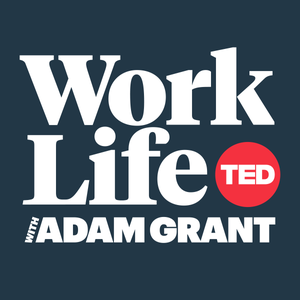 WorkLife with Adam Grant
WorkLife with Adam Grant
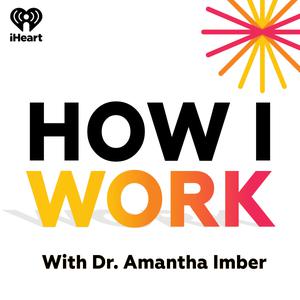 How I Work
How I Work
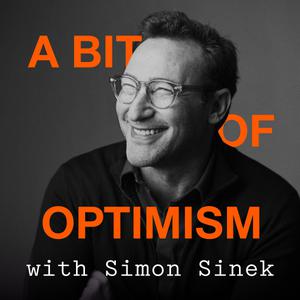 A Bit of Optimism
A Bit of Optimism
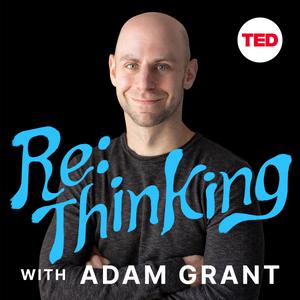 ReThinking
ReThinking
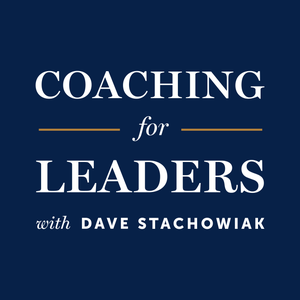 Coaching for Leaders
Coaching for Leaders